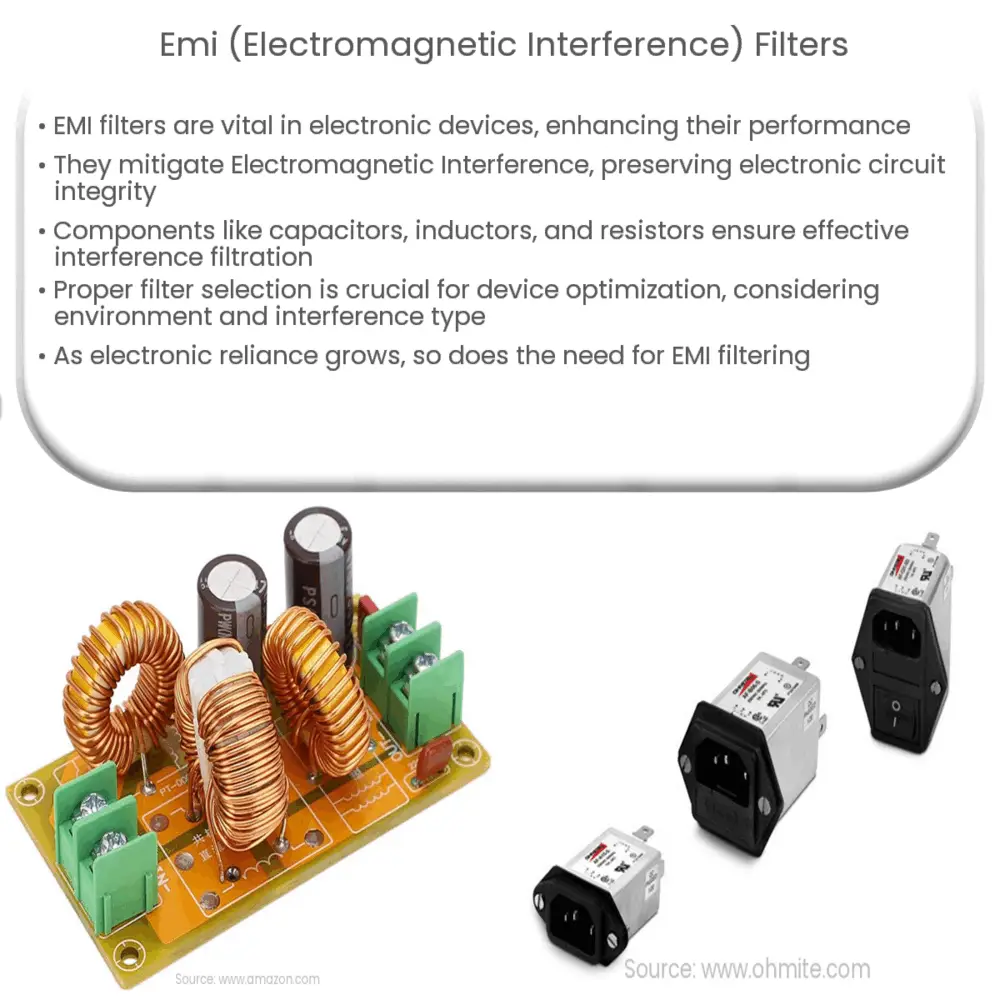Explore the importance of EMI filters in electronic devices, their components, types, working principle, and selection criteria.

Introduction to EMI Filters
EMI (Electromagnetic Interference) filters are an integral component in the realm of electronic devices. These are essential elements that play a pivotal role in improving the performance of electronic equipment, ensuring optimal functionality.
Understanding EMI
To comprehend the functionality of EMI filters, it is necessary first to understand Electromagnetic Interference. Electromagnetic Interference, or EMI, refers to the disruption caused in an electronic device due to external electromagnetic waves. These disruptions can cause substantial degradation in the performance of the equipment, leading to data loss or complete device failure in extreme cases.
The Role of EMI Filters
EMI filters are specifically designed to mitigate the effects of Electromagnetic Interference. They do so by attenuating the strength of the interfering signals, ensuring that only desired frequencies can pass through. Consequently, these filters play a critical role in maintaining the integrity of electronic circuits, thereby securing the functionality of the devices.
Components of EMI Filters
EMI filters typically comprise several components to effectively filter out unwanted frequencies. Some of the essential components include:
- Caps: Caps, or capacitors, are a crucial part of EMI filters. They serve to block DC signals while allowing AC signals to pass through, thus reducing the high-frequency noise in the circuit.
- Inductors: These components resist changes in the electric current passing through them. They are used in EMI filters to impede higher-frequency signals, thereby aiding in the filtration process.
- Resistors: These components oppose the flow of electric current. In EMI filters, they are used to dampen signals and reduce noise.
These components work synergistically, and their combined effect results in an effective barrier against unwanted electromagnetic interference. It’s important to understand the working of these components to get a full grasp of EMI filters and their operations.
The Need for EMI Filters
EMI filters are of immense importance in our tech-driven world. With the exponential increase in the usage of electronic devices, the probability of electromagnetic interference has escalated significantly. Hence, EMI filters have become an essential tool to maintain device integrity and reliability. These are extensively used in various applications, from consumer electronics to aerospace and medical devices.
Types of EMI Filters
There are various types of EMI filters, each designed to cater to specific applications or devices. Here are some of the most common types:
- Single-Phase Filters: These filters are widely used in equipment like computers, office machinery, and medical devices. They are designed to filter EMI from a single AC power line.
- Three-Phase Filters: These filters are used in high-power industrial and telecommunication applications where three-phase AC power is used.
- Feed-Through Filters: These are capacitive filters providing high-frequency filtering, commonly used in military, aerospace, and telecommunications applications.
- DC Filters: As the name implies, these filters are used in applications involving direct current (DC), such as power supplies and solar panels.
Working Principle of EMI Filters
The working principle of EMI filters is primarily based on impedance mismatching and resonance. EMI filters are designed to present high impedance to unwanted frequencies and low impedance to desired frequencies. By doing so, they limit the interference from propagating into the circuit. In case of resonant frequencies, the inductor and capacitor within the filter create a resonance peak, which further aids in filtering out the interfering signals.
Choosing the Right EMI Filter
Choosing the right EMI filter is crucial to ensure optimal performance of an electronic device. Key considerations should include the type of device, the environment in which it will be used, the type of interference expected, and the required filtering performance. One should also consider the specific safety and compliance standards applicable to their field.
Conclusion
In conclusion, EMI filters are an integral part of modern electronic devices. Their role in mitigating the effects of electromagnetic interference is critical to ensuring device performance and reliability. With a clear understanding of EMI and the purpose of EMI filters, one can better appreciate their importance in various applications. From consumer electronics to industrial machinery, the presence of EMI filters is pivotal in maintaining the integrity and functionality of electronic circuits. As our reliance on electronics continues to grow, so too does the importance of effective EMI filtering.

